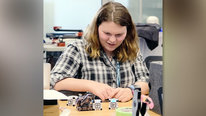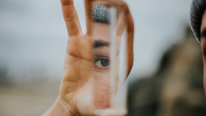LOGAN GIN
Are students with disabilities being accommodated in changing college STEM le...
NSF Awards: 1311230
As college teaching environments transition away from exclusively traditional in-person lectures, the standard suite of accommodations for students with disabilities becomes insufficient. Additionally, the COVID-19 pandemic has fundamentally changed STEM education and created an array of novel challenges for all undergraduates, including students with disabilities. In this video, we will describe findings about the experiences of students with disabilities in active learning classrooms and online learning environments, focusing specifically on challenges that are specific to these learning contexts. We will posit that institutions may need to consider modifying student accommodations and the process for obtaining them in order to create inclusive learning spaces for students with disabilities.
Are students with disabilities being accommodated in changing college STEM le...
NSF Awards: 1311230
As college teaching environments transition away from exclusively traditional in-person lectures, the standard suite of accommodations for students with disabilities becomes insufficient. Additionally, the COVID-19 pandemic has fundamentally changed STEM education and created an array of novel challenges for all undergraduates, including students with disabilities. In this video, we will describe findings about the experiences of students with disabilities in active learning classrooms and online learning environments, focusing specifically on challenges that are specific to these learning contexts. We will posit that institutions may need to consider modifying student accommodations and the process for obtaining them in order to create inclusive learning spaces for students with disabilities.
-
 Center for Neurotechnology: Creating Access for All
Center for Neurotechnology: Creating Access for All
Sheryl Burgstahler
-
 Women with Disabilities in STEM Academic Careers
Women with Disabilities in STEM Academic Careers
Brianna Blaser
-
 Cultivating Inclusive STEM for Young Children
Cultivating Inclusive STEM for Young Children
Chih-Ing Lim
-
 Mentoring Students with Disabilities in Research Experiences
Mentoring Students with Disabilities in Research Experiences
Richard Ladner
-
 Increasing Access to Informal STEM Learning
Increasing Access to Informal STEM Learning
Scott Bellman
-
 The invisibility of students with disabilities in STEM
The invisibility of students with disabilities in STEM
Hsiu-Ping Liu
2398 Views
Continue the discussion of this presentation on the Multiplex. Go to Multiplex
2398 Views
presentation
has been viewed
Related videos you might be interested in...
-
 Center for Neurotechnology: Creating Access for All
Center for Neurotechnology: Creating Access for All
Sheryl Burgstahler
-
 Women with Disabilities in STEM Academic Careers
Women with Disabilities in STEM Academic Careers
Brianna Blaser
-
 Cultivating Inclusive STEM for Young Children
Cultivating Inclusive STEM for Young Children
Chih-Ing Lim
-
 Mentoring Students with Disabilities in Research Experiences
Mentoring Students with Disabilities in Research Experiences
Richard Ladner
-
 Increasing Access to Informal STEM Learning
Increasing Access to Informal STEM Learning
Scott Bellman
-
 The invisibility of students with disabilities in STEM
The invisibility of students with disabilities in STEM
Hsiu-Ping Liu

Michael Moore
Thanks, Logan and colleagues for shining a light on how the pandemic has adversely impacted students with disabilities. I have noticed these inequities manifested so strongly in my students with invisible disabilities. This is definitely something on which a more focused discussion is warrented!
Logan Gin
Arizona State University
Thanks for watching Michael! We appreciate your comments.
Toby Baker
Thank you Logan. As I did my dissertation research for my Ph.D. on this topic, Postsecondary students with disabilities and higher education faculty accommodations, I appreciate your video! As an adult graduate student with a learning disability, I can relate to the struggles of being taught concepts without the appropriate accommodations and aching to understand the material. In my recent Qualitative study, there are more students with disabilities requesting services and the professors are not trained adequately to employ the strategies. This is even more difficult to provide equal access to higher education. Thank you for your research.
Logan Gin
Arizona State University
Thank you Toby! It is neat to see others who are doing related work. I would love to connect with you further to learn from your findings particularly related to faculty accommodations and the strategies they are (or not) employing.
Barry Fishman
Professor
Thank you for tackling this important topic! It is far too often the case that we overlook these learners, and it makes (sad) sense that the rapid transitions in Covid only made things worse. I'm curious if you also encountered any novel solutions that technologies like Zoom might have enabled. For instance, you note that it was harder to access note takers (I actually had a notetaker from my school's office of disability services in my Zoom classrooms for one learner). BUT... since Zoom can generate session recordings and transcripts, does that in any way replace or reduce the need for a note taker?
Logan Gin
Arizona State University
Thank you for your comments and insights, Barry! While it is not featured in this video, several students did allude to the fact that the transition to online resulted in unique solutions. As you mentioned, Zoom recorded lectures, real-time captioning, and transcriptions of the video session after class (posted for students to revisit) is one example of a solution to meet the needs of students. Additionally, in some instances, the asynchronous nature of instruction replaced the need for absences/attendance accommodations.
Another example that we see is that individuals with disabilities, such as those with chronic health conditions, may have previously requested to work remotely, but it was perhaps against the policy of the institution to do so. However, in general, COVID-19 normalized “telework” or working from home.
Barry Fishman
Margie Vela
Senior Program Manager
This is a great topic. Thank you for creating an awareness for equity in online learning environments. The pandemic sure made an impact on the way traditional teaching and learning is done, and it seems that some classes will remain to be taught in an online platform in the future. What do you think universities should be doing now to offer these courses in an equitable way?
Logan Gin
Arizona State University
Thank you Margie! As you mentioned, some of our courses will likely remain online in the future. Even prior to COVID-19, there have been general trends in higher education to adopt more online coursework. As online course offerings remain (and grow), we encourage more research to establish evidence-based accommodations for online courses to allow students the same access to accommodations as they would in-person courses. Students can often choose from a list of accommodations for their in-person courses, but in most instances, a similar system does not exist for online. We also recommend that departments educate instructors on how some of their instructional decisions may impact disproportionately negatively affect students with disabilities in online settings, such as the overwhelming detrimental effects of using test proctoring systems. Additionally, it is our hope that more and more instructors adopt a universal design for learning teaching philosophy as the continue to create new online courses and revise existing ones.
Susan Foutz
Margie Vela
Scott Bellman
Thanks Logan for exploring this issue. I'd be curious to hear about what students said as far as their own strategies for success. As they faced these challenges, what actions or tips would they suggest to other students with disabilities. Our programs offer mentoring communities for STEM students with disabilities, and it would be fun to share this information broadly with students.
Logan Gin
Arizona State University
Thanks Scott! I appreciate you sharing this resource. It would be neat to share something like this with students at the beginning of the school year this upcoming fall. As you referenced, I certainly think there is value in students sharing successful strategies and tips with one another. From our interviews, we see that some students were able to assist each other with communication and advocacy with instructors. For example, some students may have asked an instructor about a particular policy/deadline/etc. which was then shared with peers. However, some of the peer support was difficult to emulate in an online setting with fewer interactions between students depending on how the course was delivered.
Scott Bellman
Marley Jarvis
Thank you for sharing this important work! What suggestions do you have to help improve online STEM instruction in ways that are more inclusive?
Logan Gin
Arizona State University
Thanks Marley! As instructors are being provided with more notice that they will be teaching STEM courses online, they can use universal design for learning as they develop their courses. Universal design for learning is a framework focused on designing accessible learning environments in which the needs of all learners are considered without specialized adaptation or accommodation. An example of applying the universal design for learning framework in online instruction could be ensuring that synchronous class sessions are recorded, captioned, and posted for all students to access.
Marley Jarvis
Lisette Torres-Gerald
Great video, Logan!
Logan Gin
Arizona State University
Thank you!
Lindsay Palmer
I loved learning about your work!
Logan Gin
Arizona State University
Thanks Lindsay!
Brian Foley
Professor
These stories are really important and it is great that your work is able to highlight these issues. Do we know how widespread these problems are? For example, do you know if requests for accommodations or support higher or lower than pre-covid?
Shellie Banfield
I learned through this video that ALL departments needed to reach out to students during the transition to online learning. Academic Affairs, Financial Aid, Testing Services, Student Activities, and most especially, Disabilities Resources. As colleges and universities navigated this rather large change to delivery of instruction all departments needed to find ways to assist students. Well done video.
Sarup Mathur
Great topic and great video. I agree that ALL departments needed to to reach out. How can the special education programs In IHEs assist the Disability Resource Centers in ensuring that every student with disability has the needed accommodations? What are some suggestions you have for improving this situation? What were some of the challenges experienced by these centers of resources? Just curious to know more about these questions.
Susan Foutz
I was viewing this video thinking of all the undergraduate interns we now have who either completed entire internships virtually (Summer and Fall 2020) or have had hybrid internships (Spring and Summer 2021). I get the feeling from my 7+ years of mentoring interns, that interns aren't always good at advocating for themselves. They don't want to be the squeaky wheel. I'll share this video with my colleagues at the museum--we need to raise the awareness of the inherent pros and cons the virtual and open up a space to talk about what it means for all of us, but especially interns who may have a disability.